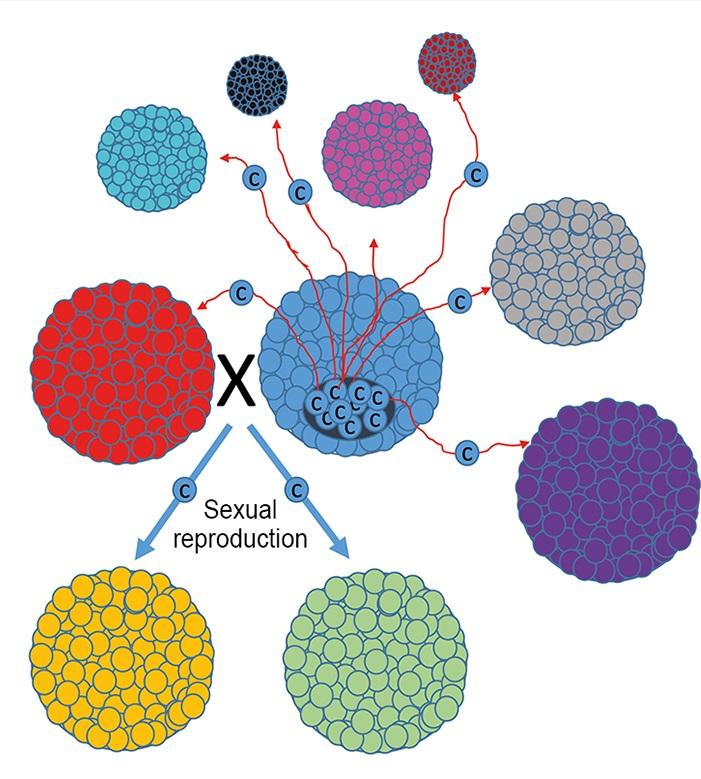
Credit:
One of the greatest enigmas of evolutionary biology is that while sex is the dominant mode of reproduction among multicellular organisms, asexual reproduction appears much more efficient and less costly. However, in a study publishing on June 6 in the open-access journal PLOS Biology, researchers suggest that sexual reproduction is favored by selection because, unlike asexual reproduction, it not only provides important evolutionary advantages in constantly changing environments, but also prevents the invasion of transmissible cancer, or “cheater” cells.
Multicellular organisms are societies of cooperating clonal cells that emerged and evolved one billion years ago. A key point in the evolution of multicellular organisms was therefore the ability to prevent cheater cells from overexploiting the cooperative system; this evolutionary constraint favoured the emergence of the many known mechanisms that suppress cancer, notably the immune system. Whatever the efficiency of these mechanisms, a prerequisite of all these defences is the ability to recognize cheater cells from normal ones.
Not only did first multicellular organisms have to deal with their own cheater cells, they also had to evolve adaptations to prevent them being colonized by foreign malignant cells (i.e. infectious ones). Because asexual reproduction leads to identical (“clonal”) organisms, this mode of reproduction is risky due to the possibility of being invaded by clonal infectious cell lineages (i.e. transmissible cancers). Conversely, sexual reproduction decreases the compatibility of contagious cancer cells with their hosts, limiting individual infection risk, as well as the risks of transmission between parent and offspring. Sexual reproduction also generates genetic variation that facilitates the detection of foreign cells, the first and critical step of immune protection.
Although relatively rare, transmissible cancers do exist (e.g. Tasmanian devils, dogs, bivalves), and increasing evidence suggests that most, if not all, malignant cells are potentially transmissible provided a suitable transmission route is offered. Given the ubiquity of cancer in multicellular organisms, in combination with the plethora of potential transmission routes, sexual reproduction may have been favoured as a less risky, more profitable option to produce viable offspring despite its associated costs.
The authors claim that to their knowledge, the proposed role of transmissible cheater cells as initiator and driver force underlying the evolution of sexual reproduction is a novel explanation, that will contribute to a paradigm shift in our understanding of evolution.
###
Peer-reviewed / Opinion piece / N/A
In your coverage please use this URL to provide access to the freely available article in PLOS Biology: http://journals.
Citation: Thomas F, Madsen T, Giraudeau M, Misse D, Hamede R, Vincze O, et al. (2019) Transmissible cancer and the evolution of sex. PLoS Biol 17(6): e3000275. https:/
Funding: FT, RH and BU were supported by the ANR (Blanc project TRANSCAN) and by the CNRS (INEE). OV was supported by the Romanian Ministry of Research and Innovation in the form of an Exploratory Research Grant (PN?III?P4?ID?PCE?2016?0404) and a mobility grant (PN-III-P1-1.1-MC-2018-1986). The funders had no role in study design, data collection and analysis, decision to publish, or preparation of the manuscript.
Competing Interests: The authors have declared that no competing interests exist.
Media Contact
Frédéric Thomas
[email protected]
Related Journal Article
http://dx.




